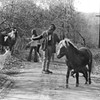Published February 26, 2003 at 5:00 p.m.
The enigmatic Everlyn Sampi looked like a typical American teen in jeans and a sweatshirt at last August's Montreal World Film Festival. But she's actually an Aboriginal actress who was in Quebec to promote Rabbit-Proof Fence, a true story from Down Under set in 1931. Directed by Philip Noyce, the historical drama opens this weekend at the Savoy Theater in Montpelier.
Although new to the profession, Sampi gives a powerfully understated performance as a resourceful adolescent named Molly, whose "half caste" status is anathema to Australia's white government. The official policy, which was not abolished until 1971, involved forcibly placing such children in residential schools that were strict and bleak enough to qualify as concentration camps.
Few happily-ever-afters awaited the people who would come to be known as the Stolen Generations. The youngsters were indoctrinated in preparation for an insidious breeding program that regulated their choice of partners. The prevailing theory was that if biracial individuals married only other light-skinned natives, their descendants would eventually have no black physical characteristics whatsoever -- a kind of slow genocide.
Fathered by transient white laborers, 14-year-old Molly Craig, her younger sister Daisy (Tianna Sansbury) and their cousin Gracie (Laura Monaghan) live a hardscrabble existence with the single mothers and grandmothers of the "Jigalong Mob." These matriarchal nomads wage a brave but futile resistance against the legalized kidnapping of their kin.
Sent 1500 miles away to a rural Christian orphanage, Molly, Daisy and Gracie are installed in a drab dormitory with dozens of fellow captives. They're required to sleep on cots, eat unfamiliar food, use a bucket for a toilet, train for factory work or domestic servitude, and abandon their own language. "We don't use that jabber here," a somber nun tells them as a means of enforcing the English-only rule.
The massive dislocation is micro-managed by Mr. Neville, the appointed Chief Protector of the regional indigenous population who talks of solving "the colored problem." As played by Kenneth Branagh, he exemplifies the bigoted banality of the ruling class. And his matter-of-fact rectitude is a much more interesting take than garden-variety villainy.
Dubbed "Mr. Devil," this efficient bureaucrat is simply oblivious to the inhumanity of the country's shameful experiment in social engineering. This is only a decade before the Nazis' ethnic-cleansing program in Europe.
When Molly leads Daisy and Gracie in a daring escape, the trio has no choice but to make the 1500-mile trip home on foot. Their navigational guideline is the rabbit-proof fence of the title -- a barrier that traverses the island continent to protect farmland from hungry bunnies.
Without food or water, the waifs live by their wits during a nine-week journey through the rugged Outback. The authorities pursue them and dispatch a wily Aboriginal tracker (David Gulpilil of Walkabout fame) who's has mixed emotions about his task. During this suspense-filled chase, Peter Gabriel's mournful score seems to echo across the forbidding landscape, which is beautifully captured by cinematographer Christopher Doyle.
Michael Caine recently earned an Oscar nomination for his role in Noyce's other current release, The Quiet American, which was shot in Vietnam. The Aussie filmmaker returns to his homeland in Rabbit-Proof Fence after many years of high-profile Hollywood projects such as Patriot Games and Clear and Present Danger. This latest action-adventure, adapted from a book by the real-life Molly Craig's daughter, replaces explosions and car crashes with the indomitable spirit of three little girls.
-Ordinary Sinner, which opened in New York City last week, was shot on the Green Mountain College campus in southern Vermont during the summer of 2000. Students worked as extras in the indie film, which had a meager budget of $500,000. The New York director, John Henry Davis, is a cinema studies professor at LaGuardia Community College in Queens. The picture concerns a heterosexual romantic triangle that's complicated by a subplot about gay-bashing. It won two top prizes at the 2002 Slamdunk Festival in Utah, but has received generally negative reviews from Big Apple critics.
-Oops! The dates of Burlington's Estrogen Fest were incorrect in last week's column. Distracted by the ticking of our biological clocks, we flick chicks periodically lose track of what day it is. The event will be held at FlynnSpace this coming Friday, Saturday and Sunday, February 28 through March 2. Check the Web site for details.
More By This Author
Speaking of Movies
-

Next Month Brings the Final Curtain for Palace 9 Cinemas
Oct 27, 2023 -

Book Review: 'Save Me a Seat! A Life With Movies,' Rick Winston
Aug 30, 2023 -

Steve MacQueen Named Executive Director of Vermont International Film Festival
May 22, 2023 -

Vermonters Are Going Back to the Movies — Under the Stars
Aug 26, 2020 -

Where to Catch a Movie Near Burlington
Sep 11, 2018 - More »
Comments
Comments are closed.
From 2014-2020, Seven Days allowed readers to comment on all stories posted on our website. While we've appreciated the suggestions and insights, right now Seven Days is prioritizing our core mission — producing high-quality, responsible local journalism — over moderating online debates between readers.
To criticize, correct or praise our reporting, please send us a letter to the editor or send us a tip. We’ll check it out and report the results.
Online comments may return when we have better tech tools for managing them. Thanks for reading.









































